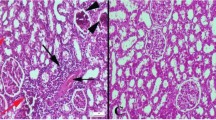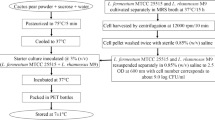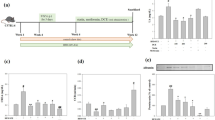Abstract
Ceterach officinarum DC has been used in medicine as an antioxidant, anti-inflammatory, antifungal, and antibacterial agent. The aim of the present study was to investigate the hepatoprotective and hematoprotective effects of C. officinarum DC aqueous extract (CO) against streptozocin (STZ)-induced diabetes in mice. In this study, 60 mice were used. Diabetes was experimentally induced by intraperitoneal injection of STZ in 50 mice. Fasting blood glucose levels were assessed everyday by glucometer strips. Mice with plasma glucose level > 250 mg/dL were considered diabetic. After 3 days, they were divided randomly into six groups. Groups 1 and 2 served as non-diabetic and untreated diabetic controls, respectively. Group 3 received 50-mg/kg glibenclamide orally. Groups 4, 5, and 6 were given 50, 100, and 200 mg/kg, respectively, of CO for 20 days orally. At 20th day, the mice were dissected and blood and liver samples collected for hematological, biochemical, and histological parameter analysis. Different doses of CO (especially CO200) could significantly (p ≤ 0.05) decreased the raised levels of ALP, AST, ALT, cholesterol, LDL, WBC, and platelet and increased HDL, SOD, CAT, and RBC parameters as compared to the untreated group. The weight and volume of the hepatic structures were decreased significantly (p ≤ 0.05) in different doses of CO as compared to the untreated group. In conclusion, CO has hepatoprotective and hematoprotective properties, thereby reducing the causation of diabetes in experimental mice.








Similar content being viewed by others
References
Abei H (1974) Catalase. In: Bergmeyer HU (ed) Methods of enzymatic analysis. Academic Press, New York, pp 673–684
Ahmed D, Kumar V, Verma A, Gupta PS, Kumar H, Dhingra V, Mishra V, Sharma M (2014) Antidiabetic, renal/hepatic/pancreas/cardiac protective and antioxidant potential of methanol/dichloromethane extract of Albizzia Lebbeck Benth. stem bark (ALEx) on streptozotocin induced diabetic rats. BMC Complement Altern Med 14:243–260
Breyer MD, Bottinger E, Brosius FC, Coffman TM, Harris RC, Heilig CW, Sharma K, AMDCC (2005) Mouse models of diabetic nephropathy. J Am Soc Nephrol 16(1):27–45
Brosius FC, Alpers CE, Bottinger EP, Breyer MD, Coffman TM, Gurley SB, Harris RC, Kakoki M, Kretzler M, Leiter EH, Levi M, McIndoe RA, Sharma K, Smithies O, Susztak K, Takahashi N, Takahashi T (2009) Mouse models of diabetic nephropathy. J Am Soc Nephrol 20(12):2503–2512
Durdevic L, Mitrovic M, Pavlovic P, Bojovic S, Jaric S, Oberan L, Gajic G, Kostic O (2007) Total phenolics and phenolic acids content in leaves, rhizomes and rhizosphere soil under Ceterach officinarum D.C., Asplenium trichomanes L. and A. adiantum nigrum L. in the Gorge of Si’cevo (Serbia). Ekologia Bratislava 26:164–173
Faramarzi E, Zangeneh MM, Zangeneh A, Moradi R (2017) Effect of Cinnamomum zelanicumon oil on hyponeophagia anxiety test in Balb C male mice. Onl J Vet Res 21(2):77–80
Foroughi A, Pournaghi P, Najafi F, Zangeneh A, Zangeneh MM, Moradi R (2017) Medicinal plants: antibacterial effects and chemical composition of essential oil of Foeniculum vulgare. Int J Curr Pharm Rew Res 8(1):13–17
Ghashghaii A, Hashemnia M, Nikousefat Z, Zangeneh MM, Zangeneh A (2017) Wound healing potential of methanolic extract of Scrophularia striata in rats. Pharm Sci 23(4):256–263
Goodarzi N, Zangeneh MM, Zangeneh A, Najafi F, Tahvilian R (2017) Protective effects of ethanolic extract of Allium saralicum R.M. Fritsch on CCl4-induced hepatotoxicity in mice. J Rafsanjan Univ Med Sci 16(3):227–238
Goodarzi N, Zangeneh MM, Zangeneh A (2018) The effect of ethanolic extract of Allium saralicum R.M. Fritsch on diabetic hepatopathy in male mice. Sci Res J Shahed Univ 25(132):21–30
Hagh-Nazari L, Goodarzi N, Zangeneh MM, Zangeneh A, Tahvilian R, Moradi R (2017) Stereological study of kidney in streptozotocin-induced diabetic mice treated with ethanolic extract of Stevia rebaudiana (bitter fraction). Comp Clin Pathol 26(2):455–463
Halliwell B, Gutteridge J (1984) Oxygen toxicity, oxygen radicals, transition metals and disease. Biochem J 219(1):1–14
Huff GR, Huff WE, Balog JM, Rath NC, Anthony NB, Nestor KE (2005) Stress response differences and disease susceptibility reflected by heterophil to lymphocyte ratio in turkeys selected for increased body weight. Poult Sci 84(5):709–717
Jaberian H, Piri K, Nazari J (2013) Phytochemical composition and in vitro antimicrobial and antioxidant activities of some medicinal plants. Food Chem 136(1):237–244
Khanahmadi M, Shahrezaei F (2008) Review and identify the chemical constituents of volatile oils of Falcaria vulgaris Bernh. J Med Plants 6(3):52–57
Kraynak AR, Storer RD, Jensen RD, Kloss MW, Soper KA, Clair JH, DeLuca JG, Nichols WW, Eydelloth RS (1995) Extent and persistence of streptozotocin-induced DNA damage and cell proliferation in rat kidney as determined by in vivo alkaline elution and BrdUrd labeling assays. Toxicol Appl Pharmacol 135(2):279–286
Larson CT, Gross WB, Davis JW (1985) Social stress and resistance of chicken and swine to Staphylococcus aureus challenge infections. Can J Comp Med 49(2):208–210
Le-Devehat C, Khodabandehlou T, Vimeux M (2001) Impaired hemorheological properties in diabetic patients with lower limb arterial ischaemia. Clin Hemorheol Microcirc 25(2):43–48
Lenzen S (2008) The mechanisms of alloxan- and streptozotocin-induced diabetes. Diabetologia 51(2):216–226
Mandarim-de-Lacerda CA (2003) Stereological tools in biomedical research. An Acad Bras Cienc 5(4):469–486
Martin JP Jr, Dailey M, Sugarman E (1987) Negative and positive assays of superoxide dismutase based on hematoxylin autoxidation. Arch Biochem Biophys 255(2):329–336
Mir S, Mishra A, Reshi Z, Sharma M (2013) Preliminary phytochemical screening of some pteridophytes from district Shopian (J & K). Int J Pharm Pharm Sci 5(4):632
Moradi R, Hajialiani M, Zangeneh MM, Zangeneh A, Tahvilian R, Hidaryan H, Rezaeeasl N, Kohneshin A (2017) Antibacterial properties of an Iranian ethnomedicinal plant. Int J Ayu Pharm Chem 6(3):128–137
Najafi F, Tahvilian R, Zangeneh MM, Zangeneh A, Moradi R (2016) Screening of essential oil of Allium sativum for antibacterial effects against Bacillus subtilis. Int J Rec Sci Res 7(11):14172–14176
Najafi F, Goodarzi N, Zangeneh MM, Zangeneh A, Hagh-Nazari L (2017) Antidiabtic and hepatoprotective effects of bitter fraction of Stevia rebaudiana alcoholic extract on streptozotocin-induced diabetic male mice. J Rafsanjan Univ Med Sci 16(6):493–504
Nyengaard JR (1999) Stereologic methods and their application in kidney research. J Am Soc Nephrol 10(5):1100–1123
Palm F, Ortster H, Hansell P, Liss P, Carlsson PO (2004) Differentiating between effects of streptozotocin per se and subsequent hyperglycemia on renal function and metabolism in the streptozotocin diabetic rat model. Diabetes Metab Res Rev 20(6):452–459
Poorshamohammad C, Souri N, Amini Z, Kosari F, Jamshidpour R, Zangeneh MM, Zangeneh A (2017) Cucurbita moschata: a plant with antibacterial properties. Int J Current Med Pharm Res 3(2):1356–1359
Pooyanmehr M, Zangeneh MM, Zangeneh A, Almasi M (2017) Effect of Verbascum thapsus aqueous extract on Escherichia coli O157:H7. Onl J Vet Res 21(9):580–583
Recknagel RO, GlendeJr EA, Britton RS (1991) Free radical damage and lipid peroxidation. In: Meeks RG (ed) Hepatotoxicology. CRC Press, Florida, pp 401–436
Rerup CC (1970) Drugs producing diabetes through damage of the insulin secreting cells. Pharmacol Rev 22(4):485–518
Roy A, Bhoumik D, Sahu RK, Dwivedi J (2014) Medicinal plants used in liver protection—a review. UK J Pharm Biosci 2(1):23–33
Saba AB, Oyagbemi AA, Azeez OI (2010) Amelioration of carbon tetrachloride-induced hepatotoxicity and haemotoxicity by aqueous leaf extract of Cnidoscolus aconitifolius in rats. Nig J Physiol Sci 25(2):139–147
Shafaghat A (2011) Volatile oil constituents and antibacterial activity of different parts of Falcaria vulgaris Bernh. growing wild in two localities from Iran. Nat Prod Res 25(4):368–373
Sherkatolabbasieh H, Hagh-Nazari L, Shafiezadeh S, Goodarzi N, Zangeneh MM, Zangeneh A (2017) Ameliorative effect of the ethanolic extract of Allium saralicum R.M. Fritsch on CCl4-induced nephrotoxicity in mice: a stereological examination. Arch Biol Sci 69(3):535–543
Shojaii A, Hashem-Dabaghian F, Goushegir A, Abdollahi-Fard M (2011) Antidiabetic plants of Iran. Acta Medica Iranica 49(10):637–642
Swenson MJ (1993) Physiological properties and cellular and chemical constituent of blood. In: Dukes’ physiology of domestic animals. Comstock Publishing Associates, Ithaca and London, pp 29–32
Tahvilian R, Moradi R, Zhaleh H, Zangeneh MM, Zangeneh A, Yazdani H, Hajialiani M (2017) Chemical composition and screening of antibacterial activity of essential oil of Pistacia khinjuk against two selected pathogenic bacteria. Ann Trop Med Public Health 10(5):1159–1164
Tay YC, Wang Y, Kairaitis L, Rangan GK, Zhang C, Harris DCH (2005) Can murine diabetic nephropathy be separated from superimposed acute renal failure? Kidney Int 68(1):391–398
Tesch GH, Allen TJ (2007) Rodent models of streptozotocininduced diabetic nephropathy. Nephrology (Carlton) 12(3):261–266
Weiss RB (1982) Streptozocin: a review of its pharmacology, efficacy and toxicity. Cancer Treat Rep 66(3):427–438
Zangar RC, Benson JM, Burnett VL, Springer DL (2000) Cytochrome P4502E1 is the primary enzyme responsible for low-dose carbon tetrachloride metabolism in human liver microsomes. Chem Biol Interact 125(3):233–243
Zangeneh A, Zangeneh MM, Hajialiani M, Moradi R, Nazari F, Sanjabi Shirazi F, Ansari N, Lotfi-Hamadani M, Ekhtiari A (2017) Peruse a plant product as an antimicrobial agent. Int J Current Med Pharm Res 3(2):1348–1351
Zangeneh MM, Goodarzi N, Zangeneh A, Najafi F, Tahvilian (2018) Hypoglycemic and nephroprotective effects of aqueous extract of Stevia rebaudiana (sweet fraction) in streptozotocin-induced diabetic mice. J Ardabil Univ Med Sci 17(4):437–446
Author information
Authors and Affiliations
Corresponding author
Rights and permissions
About this article
Cite this article
Zangeneh, M.M., Zangeneh, A., Bahrami, E. et al. Evaluation of hematoprotective and hepatoprotective properties of aqueous extract of Ceterach officinarum DC against streptozotocin-induced hepatic injury in male mice. Comp Clin Pathol 27, 1427–1436 (2018). https://doi.org/10.1007/s00580-018-2754-x
Received:
Accepted:
Published:
Issue Date:
DOI: https://doi.org/10.1007/s00580-018-2754-x




